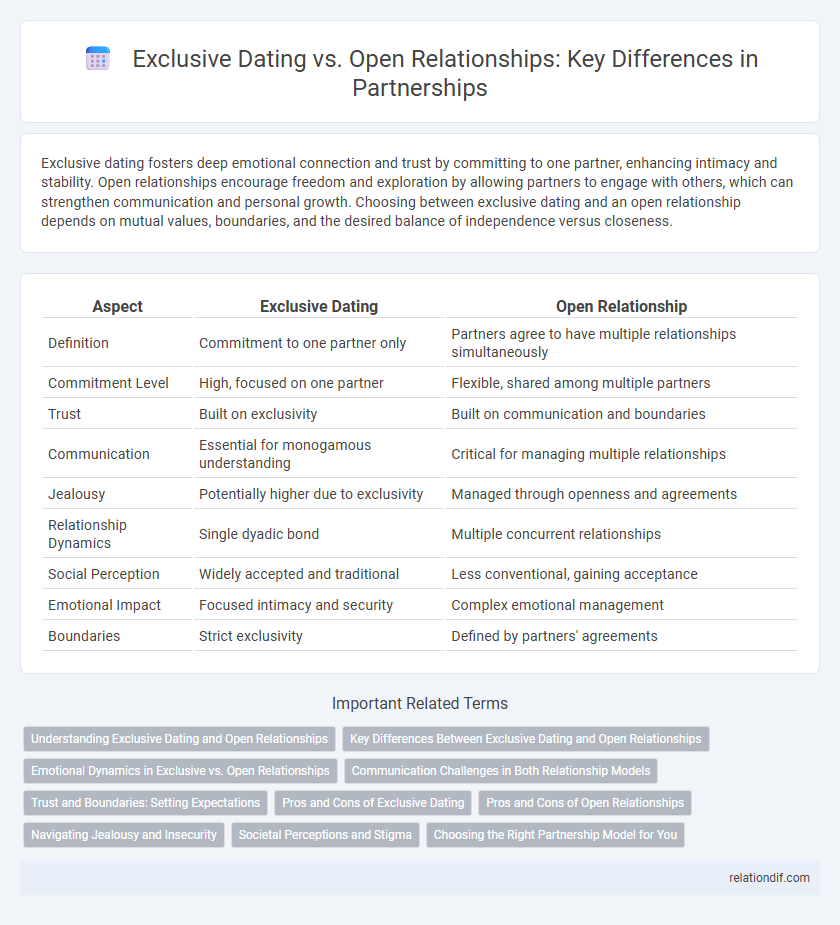Exclusive dating fosters deep emotional connection and trust by committing to one partner, enhancing intimacy and stability. Open relationships encourage freedom and exploration by allowing partners to engage with others, which can strengthen communication and personal growth. Choosing between exclusive dating and an open relationship depends on mutual values, boundaries, and the desired balance of independence versus closeness.
Table of Comparison
| Aspect | Exclusive Dating | Open Relationship |
|---|---|---|
| Definition | Commitment to one partner only | Partners agree to have multiple relationships simultaneously |
| Commitment Level | High, focused on one partner | Flexible, shared among multiple partners |
| Trust | Built on exclusivity | Built on communication and boundaries |
| Communication | Essential for monogamous understanding | Critical for managing multiple relationships |
| Jealousy | Potentially higher due to exclusivity | Managed through openness and agreements |
| Relationship Dynamics | Single dyadic bond | Multiple concurrent relationships |
| Social Perception | Widely accepted and traditional | Less conventional, gaining acceptance |
| Emotional Impact | Focused intimacy and security | Complex emotional management |
| Boundaries | Strict exclusivity | Defined by partners' agreements |
Understanding Exclusive Dating and Open Relationships
Exclusive dating involves two partners committing to each other with the expectation of emotional and sexual fidelity, fostering trust and deeper connection. Open relationships allow partners to engage in romantic or sexual encounters outside the primary partnership, emphasizing communication, boundaries, and mutual consent. Understanding the distinctions between these relationship styles helps individuals align their expectations and maintain healthy, fulfilling partnerships.
Key Differences Between Exclusive Dating and Open Relationships
Exclusive dating involves partners committing to one another with the understanding of monogamy, fostering emotional intimacy and trust within a closed relationship. Open relationships allow individuals to engage romantically or sexually with multiple partners, emphasizing communication, consent, and established boundaries. Key differences include commitment level, rules on outside relationships, and emotional expectations, which shape the dynamics and challenges unique to each relationship style.
Emotional Dynamics in Exclusive vs. Open Relationships
Emotional dynamics in exclusive dating often center on trust, security, and deep emotional intimacy, fostering a strong sense of commitment and stability between partners. In contrast, open relationships require continuous communication, negotiation, and emotional flexibility to navigate boundaries, jealousy, and multiple emotional connections. Understanding these differing emotional landscapes is crucial for partners to maintain healthy and satisfying relationships in both dating models.
Communication Challenges in Both Relationship Models
Communication challenges in exclusive dating often stem from expectations of loyalty and understanding unspoken boundaries, requiring partners to navigate jealousy and trust issues carefully. In open relationships, communication demands are heightened due to the need for constant honesty, negotiation of rules, and emotional transparency to manage multiple connections effectively. Both models depend heavily on clear, consistent dialogue to address insecurities and align mutual needs, ensuring relationship stability and satisfaction.
Trust and Boundaries: Setting Expectations
Establishing clear trust and boundaries is essential in exclusive dating, where partners agree on mutual commitment and fidelity to nurture emotional security. Open relationships require transparent communication to define flexible boundaries, allowing partners to explore connections while maintaining respect and honesty. Setting explicit expectations in both arrangements minimizes misunderstandings and fosters a foundation of trust and respect.
Pros and Cons of Exclusive Dating
Exclusive dating fosters deep emotional connection and trust, providing a clear commitment that reduces ambiguity and jealousy. However, it may limit social opportunities and personal freedom, potentially leading to feelings of confinement or pressure. This relationship style suits individuals seeking stability and focused intimacy but may not fit those valuing flexibility and diverse experiences.
Pros and Cons of Open Relationships
Open relationships offer the advantage of increased personal freedom and the ability to explore multiple emotional and physical connections without traditional restrictions, often enhancing communication and trust between partners. However, they can also introduce challenges such as jealousy, boundary-setting difficulties, and potential social stigma, requiring strong emotional maturity and ongoing negotiation. Successful open relationships depend on clear agreements, mutual respect, and consistent honesty to balance autonomy with commitment.
Navigating Jealousy and Insecurity
Exclusive dating fosters a sense of security and reduces jealousy by establishing clear boundaries and mutual commitment, which helps partners feel valued and prioritized. Open relationships require strong communication skills and trust to navigate jealousy and insecurity, emphasizing emotional transparency and regular check-ins. Understanding personal triggers and setting agreed-upon guidelines can minimize emotional distress and strengthen the partnership's foundation.
Societal Perceptions and Stigma
Exclusive dating is often perceived as socially normative, aligning with traditional values that emphasize commitment and stability, which generally results in greater societal acceptance and lower stigma. Open relationships face challenges due to persistent cultural biases and misconceptions labeling them as unconventional or morally questionable, leading to increased social stigma and misunderstanding. Shifting societal attitudes toward inclusivity and diversity in relationship structures gradually reduce stigma, but exclusive dating remains the mainstream ideal in many communities.
Choosing the Right Partnership Model for You
Choosing the right partnership model depends on individual values, communication styles, and relationship goals. Exclusive dating offers emotional depth and security through mutual commitment, while open relationships emphasize autonomy and exploration within agreed boundaries. Assessing personal needs and having honest conversations with partners ensures a relationship structure that fosters trust, satisfaction, and long-term harmony.
exclusive dating vs open relationship Infographic

 relationdif.com
relationdif.com